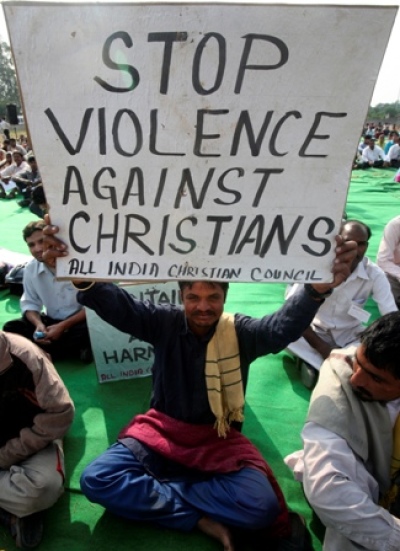India: Radical Hindus demand gov't deny benefits to Christian converts

Radical Hindu groups in India have launched a campaign to stop the country’s tribal, or indigenous, people from converting to Christianity by demanding that the government ban those who convert from receiving education and employment opportunities, according to reports.
A group called Janajati Suraksha Manch (Tribal Security Forum) in eastern Odisha state wrote to India’s Prime Minister Narendra Modi and President Ram Nath Kovind this month, urging on them to exclude converted tribal people from availing reservations in educational institutions and government and public-sector jobs as well as other protections that the country’s constitution provides for.
Similar demands have also been made in the states of Madhya Pradesh, Chhattisgarh and Jharkhand.
According to Census 2011, more than 104 million people — or 8.6% of the population — are from the various tribes that are listed in the Indian constitution for affirmative action, which was provided for on the basis of their seclusion at the time of India’s independence from British rule in 1947.
“Being tribal is by birth but religion is choice,” Ratan Tirkey, a Catholic member of the Tribes Advisory Committee of Jharkhand state, told UCA News. “It is quite surprising that right-wing groups are not ready to follow what has been written in the Constitution and bills passed in parliament on the scheme to help tribal people.”
Tirkey warned that stopping benefits meant for tribal Christians would amount to “challenging the constitution and Supreme Court, which clearly state that the scheme is meant for poor people and it was not given in the name of any religion.”
India’s “untouchable” Dalit people, as per the caste hierarchy in the Hindu society, who account for 16.6% of the country’s population, or 201.4 million, were also given affirmative action rights in the Constitution. However, a 1950 Presidential Order denied the benefits and protections to Dalits who convert to Christianity or Islam. Hindu nationalists are now seeking the same for the tribal who have converted or might convert to Christianity.
“Maintain your religion, culture and traditions,” Megha Oraon, an official of the Janajati Suraksha Manch, was quoted as saying. “Those who are taking benefits reserved for scheduled tribes from other religions should be stopped and a law should be enacted to stop people taking advantage.”
Nishikant Dubey, a member of parliament from the governing Hindu nationalist Bharatiya Janata Party, or the BJP, made the same demand in September, according to a local media.
Most tribals do not identify as Hindus; they have diverse religious practices, and many worship nature. However, the government’s Census deems them to be Hindu.
An estimated 70% of India’s 32 million Christians are Dalit, and about 20% are tribal. However, Christian persecution is prevalent mostly in districts where tribal people are in the majority, as most Dalits do not support the BJP while the tribals are seen as undecided voters.
India is ranked No. 10 on Open Doors’ 2020 World Watch List of the countries where it's most difficult to be a Christian. Open Doors notes that converts to Christianity from a Hindu background are “especially vulnerable to persecution” and are constantly under pressure to return to Hinduism.
John Prabhudoss, chairman of the Federation of Indian American Christian Organizations of North America, previously told The Christian Post that the victory of the BJP in the national election in 2014 and its reelection in 2019 “brought about a sense of confidence among the Hindu radical party cadre that now they can attack Christians and other religious minorities with impunity and they do not have to worry about the law enforcement.”





















